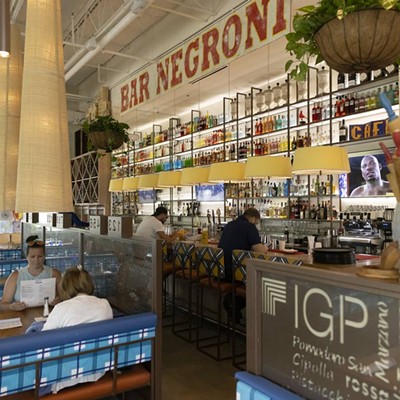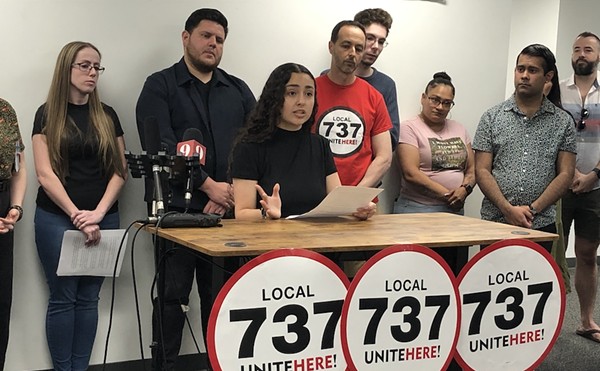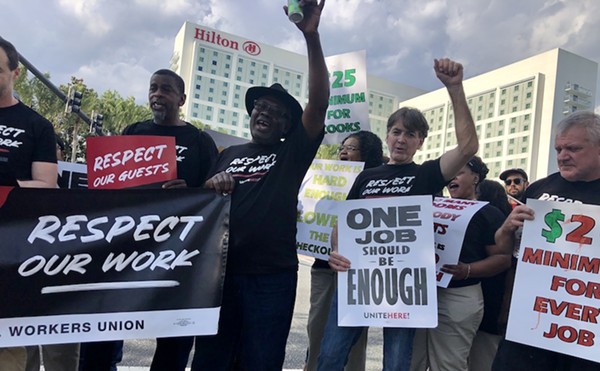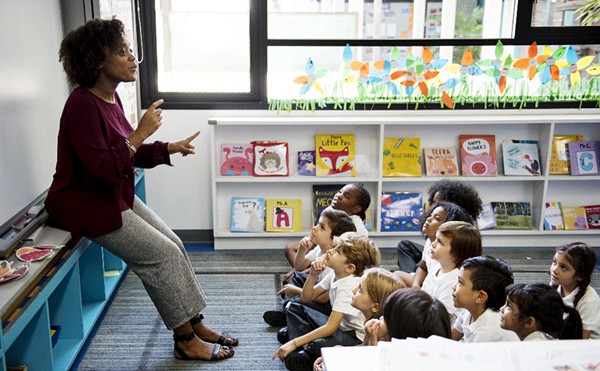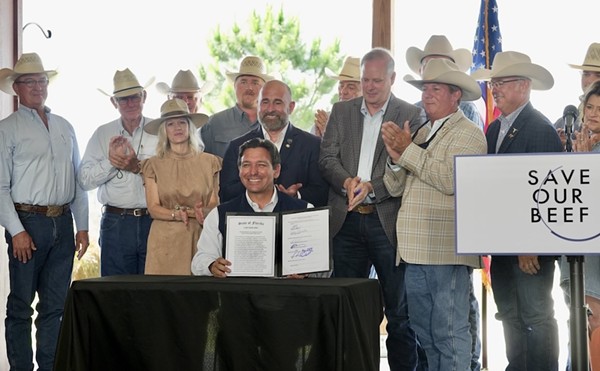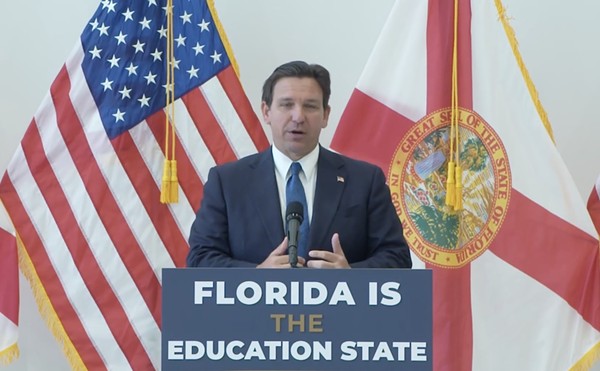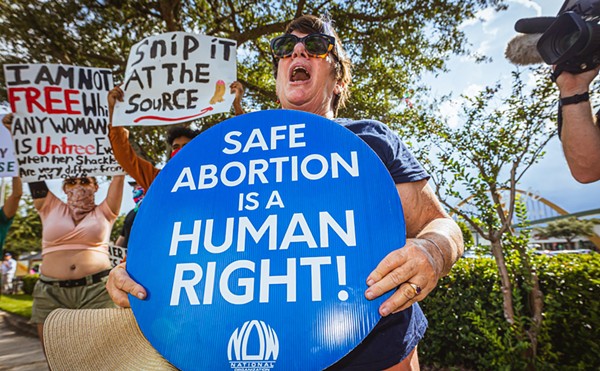The race for the presidency could begin where it ended in 2000, except the national Democratic Party won't let it
Last week a group of Democrats from across the country gathered in a third-floor ballroom of the downtown Sheraton Four Points overlooking Lake Eola. The purpose of the mixer, as it was billed by organizers, was to put the campaigns of some of the Democratic presidential candidates in touch with local activists who want to help them. Campaign workers, dressed in business attire, shared the relative merits of their nominees over glasses of wine, or in some cases, merely relied on a television and videotape recorder to play back speeches and infomercials. Several candidates for U.S. Senate took the podium, as did Doug Head, chair of the Orange County Democrats, who envisioned holding the next such mixer at the Citrus Bowl, with the next U.S. president -- a Democrat -- in attendance.
If this same event had occurred in the summer of 1991, the future U.S. president might have been there.
Twelve years ago, Democratic candidates Bill Clinton, Tom Harkin and Paul Tsongas crisscrossed the Sunshine State because they wanted to win the Florida straw poll.
A straw poll is one of the elements -- fund-raising, endorsements and sample polls being the others -- that catches the media's attention during what journalist Arthur T. Hadley once called the silent primary season. Florida Democrats typically have conducted an informal presidential ballot during their delegate convention by simply writing the name of a candidate on a square piece of paper. Clinton surprised many observers by winning in 1991 with 54 percent of the vote, trumping Senator Harkin before the traditional primary season could begin in Iowa, Harkin's home state.
In 1983, after an extraordinary number of states held presidential straw polls, the chair of the Democratic National Committee, Charles T. Manatt, declared his hatred of them, saying they were "divisive, nonuseful, expensive and extraordinarily irritating." Since then, the national Democratic Party has clamped down on straw polls, with the Clinton straw-poll victory (and subsequent election) being one of the few exceptions.
Not all Florida Democrats share that antipathy, and more than a few are angry at what they perceive as an unwillingness of new state party chairman Scott Maddox to stand up to the Democratic National Committee.
"The candidates spend enormous resources here," Doug Head says. "They give speeches. The activists get to see them up close. There's a huge media turnout. Whoever wins the straw poll makes the front page news."
Head says national Democratic chair Terry McAuliffe has threatened to bar Florida delegates at the Boston convention next July if the state went ahead with the poll. If that happened Florida, the fourth largest state and the place where the 2000 election ended, would not have a say in determining George W. Bush's challenger in 2004.
That leaves Iowa, the 30th most-populated state whose caucus officially kicks off the primary season January 19, with a lot of influence on who the Democratic challenger is.
"I love Iowa," Head says. "My great grandfather was from Iowa. I went on vacation to Iowa last July. But Iowa is not Florida. If we don't have a straw poll, we'll be lost in the shuffle next spring."
That's because Florida's primary is March 9, well after smaller states will have effectively determined the Democratic nominee.
Dave Yepsen, a longtime Des Moines Register political columnist, says Iowans haven't influenced national party leaders to keep Florida in check. They only become agitated if another state tries to move its primary ahead of theirs. "Most Democrats here could care less whether Florida has a straw poll," Yepsen says. "It was done in the past and never took the sheen off the Iowa process. I've never heard any party leaders say they were worried about what Florida was doing. About the only thing they care about is whether someone tries another caucus or primary ahead of Iowa's."
Officially, there is still a chance the straw poll will be conducted, says Florida Democratic Party spokeswoman Allie Merzer. "No decision has been made. There has not been a mandate from the DNC or anything. It is our understanding that the DNC does not want a straw poll."
Bob Poe, the former chair of the state Democratic Party, says he recalls that many of the early contenders for the Democratic nomination -- John Kerry of Massachusetts, John Edwards of North Carolina, Richard Gephardt of Missouri -- went to the DNC after the 2000 election to ask for a rule prohibiting straw polls. "They said, 'Listen, we don't want to get eaten alive by these straw polls,'" Poe says. "It's really a drain on their resources. They went in mass to the DNC to make a rule that states can't hold these beauty contests."
The penalty, according to Poe, was that the DNC would withhold delegates from the national convention. That could lead to political infighting about who is eligible to cast a vote in Boston. "An alternative delegation could be seated," says Poe, "which could create a whole crazy ball of wax."
But DNC spokesman Tony Welch says no new rule was passed. Instead, Welch says Poe must be referring to an old rule, passed in the Manatt-era prohibiting straw polls. Would the DNC enforce the rule given that the Clinton vote obviously went through without fallout?
"We don't know about enforcement until infringement," Welch says.
Though a straw poll might be good for Florida in terms of money and notoriety, it isn't necessarily good for the political process, according to political scientist Emmett Buell.
Buell, who researched straw polls for the book "In Pursuit of the White House: How We Choose Our Presidential Nominees," says the primary process is already too front-loaded. With Iowa followed quickly by New Hampshire, Arizona, South Carolina and Mississippi, he says, it isn't fair to voters or candidates to host a made-for-TV poll that provides the winner with no delegates toward the nomination.
"Florida Democrats might bitch about the loss of this sort of tradition," Buell says. "But their thinking should be, 'Let's not do this. The Republicans always have more money than we do. Why waste it on straw polls?'"
Some of the campaigns have whispered that Florida Senator Bob Graham is the reason Florida isn't conducting a straw poll. If he loses or fairs worse than expected, his candidacy will look worse than it already does.
Buell says that's nonsense. In 1983 Walter Mondale forced former Florida Governor Reuben Askew into a straw poll showdown at the Diplomat Hotel in Hollywood, a move that bankrupted Askew's campaign, eliminating him from the race.
"If John Kerry wanted to, he could stage a High Noon type deal," Buell says. "He could try to force Graham to show up for a straw poll. But I can't imagine Kerry really wants to do that. I'm sure he wants to shore up his base in New Hampshire."
Morris Reid, who worked in the Clinton-Gore administration and was a deputy director during their 1996 re-election, says Florida Democrats' focus on a straw poll is misplaced anyway. They should be more concerned with voter registration and outreach.
"Florida will be so important to this election anyway," he says. "Florida will be overwhelmed with all the attention because of what happened with George Bush and because of his brother's continuing role. Local party officials shouldn't fret. There's more than enough for them to do."
[email protected] What about Bob? He's in Iowa since Florida Dems don't want a contest (photo: Bob Whitby)


